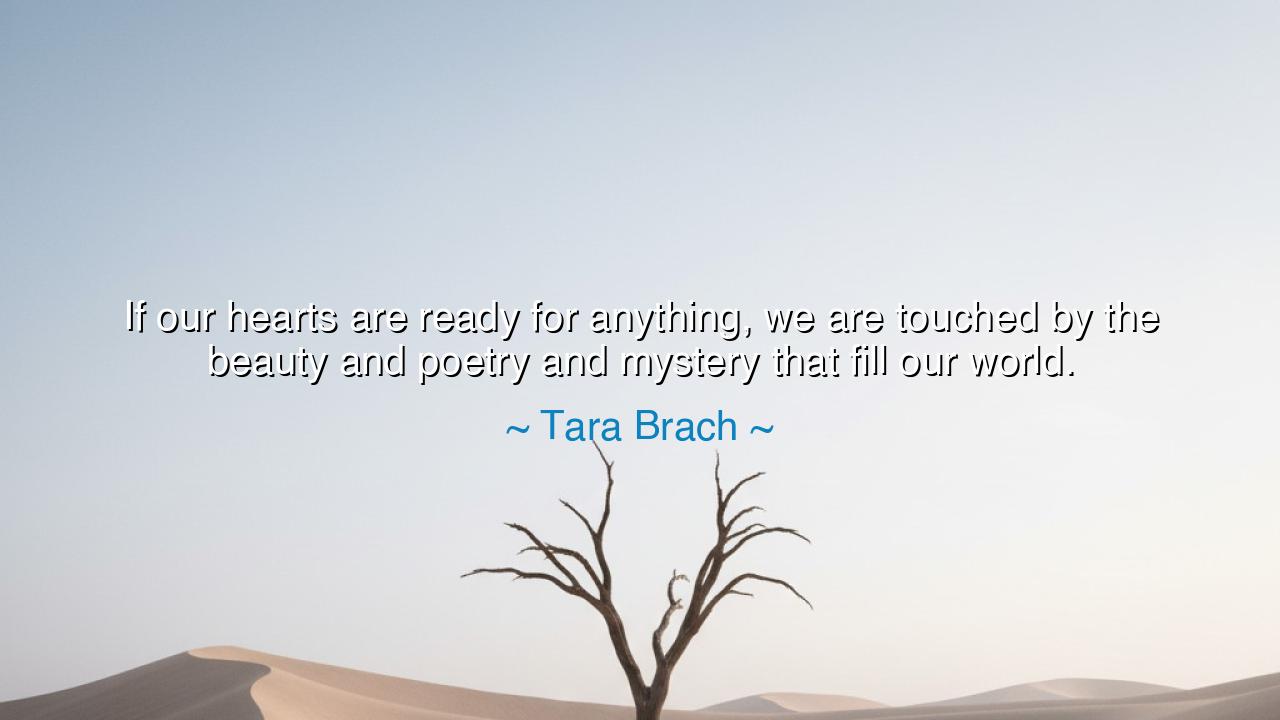
If our hearts are ready for anything, we are touched by the
If our hearts are ready for anything, we are touched by the beauty and poetry and mystery that fill our world.






Hear, O children of stillness and seekers of truth, the words of Tara Brach, who proclaimed: “If our hearts are ready for anything, we are touched by the beauty and poetry and mystery that fill our world.” In these words lies both a challenge and a promise. The challenge: to keep the heart open in a world filled with uncertainty, suffering, and change. The promise: that when the heart is thus prepared, life itself reveals its hidden treasures—beauty, poetry, and mystery that are not absent but too often unseen.
For what does it mean for the heart to be ready for anything? It is not a call to indifference, nor a summons to armor ourselves against pain. Rather, it is an invitation to surrender to life’s flow, to greet joy without clinging and to greet sorrow without despair. When the heart is unready, it resists what comes—longing only for what is pleasant and fearing all that is painful. But when it is ready for anything, it holds both in its vast embrace, like the sky that contains both storm and sunlight.
In such readiness, the ordinary is transfigured. A fallen leaf, with its fragile veins lit by autumn light, becomes a work of art. A fleeting glance from a stranger becomes a poem. A silence between words becomes a mystery more eloquent than speech. These things were always present, but only the ready heart perceives them. Brach reminds us that poetry is not confined to books, but is the texture of reality itself. To notice it requires not more knowledge, but more openness.
Consider the story of Viktor Frankl, who, imprisoned in the death camps of the Second World War, found moments of beauty even in the midst of horror. He described watching a sunset, the fiery sky above the barbed wire, and feeling, for a moment, lifted beyond despair. His heart, though broken, was ready for anything—and thus he was touched by mystery and beauty even in a place designed to extinguish hope. His life proves Brach’s truth: the readiness of the heart reveals treasures that circumstances cannot destroy.
This teaching is not new, but eternal. The Stoics of old spoke of amor fati, the love of fate, the acceptance of all that comes. The mystics of every tradition teach that surrender to the present moment opens the door to the infinite. Brach’s words stand in this lineage, calling us to recognize that the world is already overflowing with wonder, but only those who meet it without resistance will be touched by it.
The danger is clear: when our hearts are closed, we live in blindness. We complain of a world devoid of meaning, yet it is our refusal to receive what comes that makes it so. A closed heart sees only randomness where an open heart perceives mystery, sees only noise where an open heart hears poetry, sees only dust where an open heart beholds beauty. The world does not change—our readiness changes the way we encounter it.
Therefore, O seekers, the lesson is this: cultivate readiness of heart. Practice stillness, practice compassion, practice courage. When joy comes, welcome it with gratitude. When sorrow comes, welcome it with gentleness. When mystery comes, welcome it with wonder. In this way, the heart grows vast, and the world becomes luminous.
So remember Tara Brach’s wisdom: if our hearts are ready for anything, then everything—every breath, every sight, every sound—becomes a gift. Beauty, poetry, and mystery are not rare; they are the fabric of life itself. To live with a ready heart is to live awake, to live free, to live touched by the eternal. For the open heart transforms the world.






AHanhphuong ho
I love the hopefulness of this quote. It makes life sound full of hidden art waiting to be seen by those who are emotionally present. It also feels like a quiet challenge—to approach the world without cynicism, to let beauty touch us even when things are uncertain. Maybe that’s the heart of mindfulness: learning to let the poetry of existence move through us instead of past us.
CCotLin
There’s something profound in how Brach links readiness with receptivity. It reminds me that awe doesn’t come from external perfection, but from our willingness to feel. I wonder if this explains why some people find beauty everywhere while others rarely do—the difference isn’t circumstance, but openness. Can cultivating that kind of readiness change not just how we see the world, but how we live in it?
MNNguyen Man Nhi
This quote strikes me as spiritual without being religious. It’s about presence—the ability to meet life as it is and still find wonder in it. I think of times when I’ve been too busy to notice small moments of beauty, like light through leaves or a stranger’s kindness. Maybe poetry isn’t something we write; it’s how we perceive when the heart is awake.
HHy
I find this thought deeply comforting. It suggests that poetry isn’t confined to words but lives in the way we experience life itself. Brach seems to say that an open heart transforms the ordinary into something luminous. But it also makes me question—how do we prepare the heart for that kind of openness in a world full of noise and fear? Is readiness a skill, or a grace?
HTHuu Tien
This quote feels like a gentle reminder that beauty isn’t something we find—it’s something we become open to. I love how Brach ties poetry and mystery to the readiness of the heart. It makes me wonder how often we miss moments of wonder simply because we’re too guarded or distracted. Maybe the real work isn’t seeking more beauty, but softening enough to notice what’s already here.